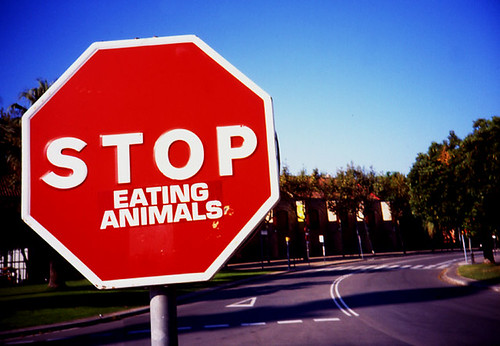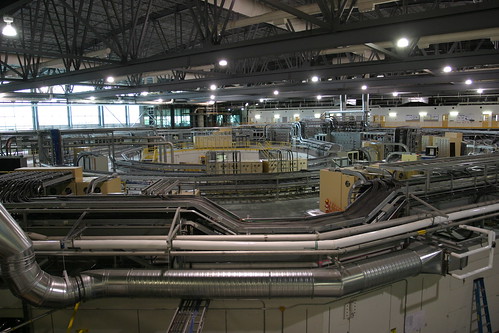Update (12/31): Looks like the Weber and Matthews paper has gotten some other attention from the internets. They put the CO2 savings a bit lower, at around 2.3 tonnes, but approximately similar.
Hey internet,
This post is unrelated to materials or inorganic chemistry. Unless you study the nanoparticles present in garbanzo beans.
My brother Lewis has been a vegetarian (well, technically, a pescetarian) for almost a year, and one of the reasons he chose to do so was to reduce his carbon footprint. I was curious as to how much of an actual difference he has made through this choice. Also, I have found that a lot of the carbon footprint calculators are frustrating to understand, so I was hoping that I could figure out the impact of a choice we make everyday without having to total up a lot of confusing statistics.
Let's make some simplifying assumptions:
- For the sake of simplicity, let's assume that the only reason Lewis would eat meat would be for protein in his diet. Protein can come from almost all foods, such as dairy, grains and vegetables, but here, protein = meat OR suitable meat alternative (in this case, beans). All of his other calories come from celery and multivitamins, I guess.
- Lewis is not the world's greatest chef; he can only make two dishes. One being lean ground beef and the other being cooked beans. He buys his beef and beans at the same grocery store, which in turn buys their food from the same supplier, to cancel out any inequalities in transportation issues. [1]
For active people, the internet recommends about 0.4-0.6 g of protein per pound of body weight per day. Lewis, a 160 lb active person, should eat about 64 to 96 g of protein per day. (source: http://www.rice.edu/~jenky/caryn/protein.html)
Meat has about 0.25 g of protein per gram, while beans have about 0.08 g of protein per gram uncooked. (source: http://www2.state.id.us/bean/nutrition/value.htm).
So, Lewis would either be eating at most about 384 g of steamy meat product (about 13 ounces) per day, or about 1200 g of steamy beans product(about 7 cups uncooked). These assumptions obviously overstate the amount of protein-rich foods that Lewis would be eating, but still. These are the consequences when you can only make two dishes. This totals 139.9 kg of beef or 437.1 kg of beans per year. And many cases of beano.
According to a 2007 study done in Japan on Japanese cattle (Lewis sure loves his Kobe, ground beef) and current farming practices (including emissions from feeding, transporting and processing the cattle, along with the amount of gas the cattle produce themselves), 1 kg of beef produces about 36.4 kg of CO2 equivalents (taking into account the emission of other gases such as methane). That means that Lewis would have been outputting 5092 kg of CO2 equivalents per year with his tasty beef bowls. (Source: Ogino, A. et al.; Animal Science Journal, 2007, 78, p 424-432).
I couldn't find a similar study done specifically on beans and in similar units, but a 2008 study states that fruits and vegetables have on average a greenhouse gas potential 1/10th that of red meat, which would put Lewis' total bean-related CO2 emission at around 3.6 per kg, or about 1574 kg (Source: Weber, C and Matthews, H; Environ. Sci. Technol. 2008, 42, 3508–3513).
Therefore, Lewis' nutritional differences have made a difference equal to around 3518 kg of CO2 equivalents, about 3.5 tonnes. In comparison, Wikipedia says that the average Canadian in 2000 was responsible for 24.3 tonnes of CO2 equivalents per year.
So, Lewis has made a difference of around 14% in his emissions by becoming a vegetarian (granted, these approximations are not entirely realistic, but I argue that I have overestimated the amount of meat Lewis is eating and therefore the difference in emissions). 
So, the next time you are reaching for that slice of bacon-wrapped Turducken, you can know just how bad it is, not only for you, but also the polar bears, you filthy jerk. And remember- every time you eat a slice of tofu, David Suzuki gets his wings!
1. The 2008 study by Weber and Matthews is quite interesting in its discussion on the concept of "food-miles." Their conclusions are that it is better to reduce consumption of red meat than it is to maintain the same diet and eat locally grown food. The main problem in eating red meat is that the cows are pretty strong greenhouse gas emitters on their own.
Sunday, December 14, 2008
carbon footprints and vegetarianism
Tags
CO2,
emissions,
GHG,
greenhouse gases,
red meat,
vegetarianism
Subscribe to:
Post Comments (Atom)

No comments:
Post a Comment